Tongue diagnosis, also known as observation diagnosis, is an important method for understanding the physiological functions and pathological changes of the body by observing the changes in the tongue’s appearance.
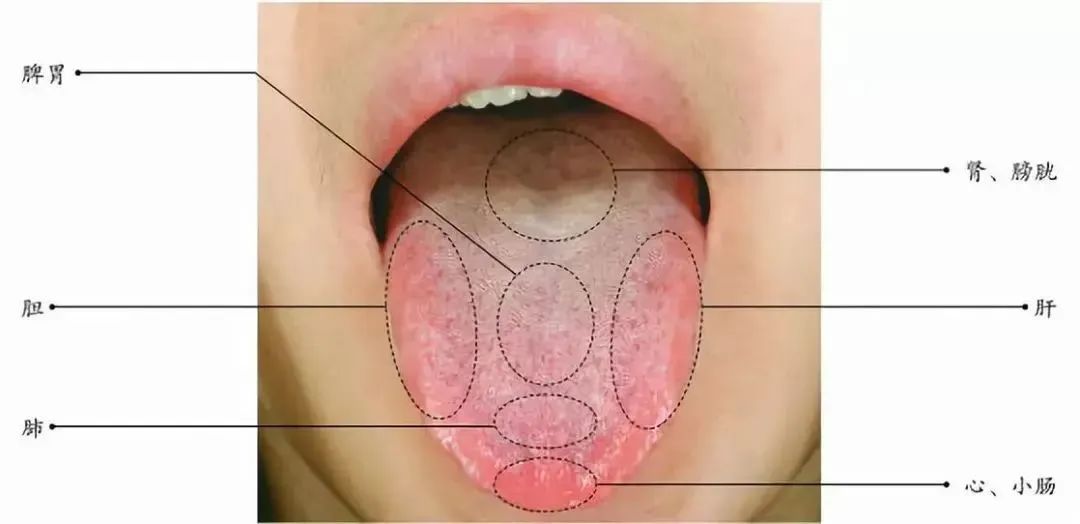
Different parts of the tongue correspond to different organs: the left side of the tongue corresponds to the liver (Gan), the right side corresponds to the gallbladder (Dan); the area from the tip to the middle corresponds to the heart (Xin), small intestine (Xiao Chang), and lungs (Fei); the middle part corresponds to the spleen (Pi) and stomach (Wei); the area from the middle to the root corresponds to the kidneys (Shen) and bladder (Pang Guang).

During tongue diagnosis, observation is conducted in the order of tip – middle – root – sides. First, observe the tongue body, then the tongue coating, for about 30 seconds. If the initial observation is unclear, allow the patient to rest for 3-5 minutes before re-examining.
Normal
Tongue
Appearance
Pale red tongue with thin white coating
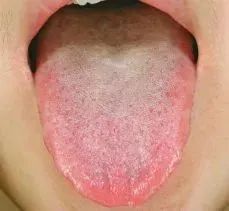

Eight Types of Tongue Appearance

01
Individuals with Qi Deficiency

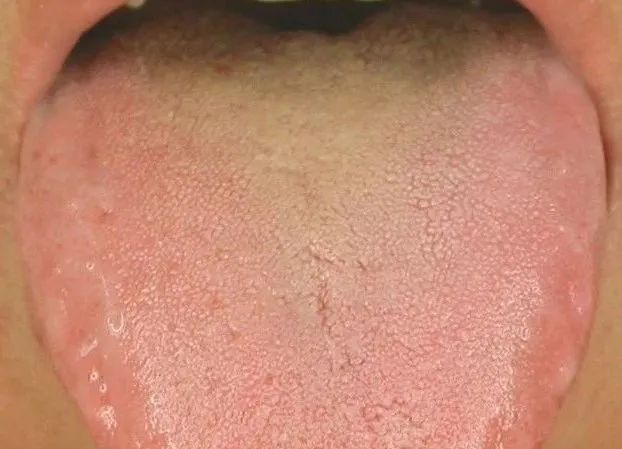
Cracked tongue in the middle
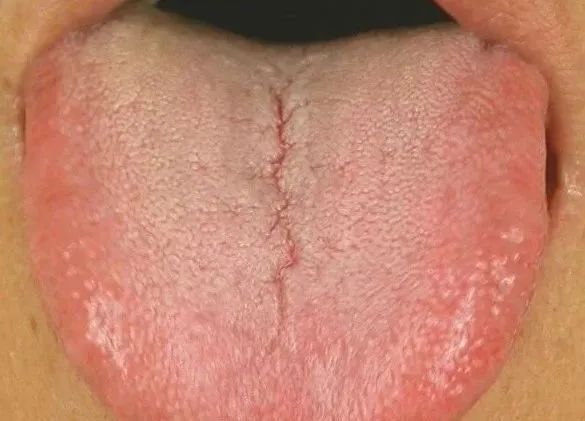
Spleen and blood deficiency
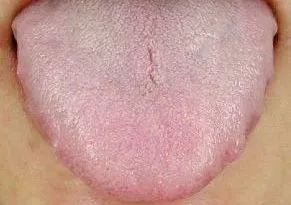
Thick tongue coating with teeth marks, tongue without coating
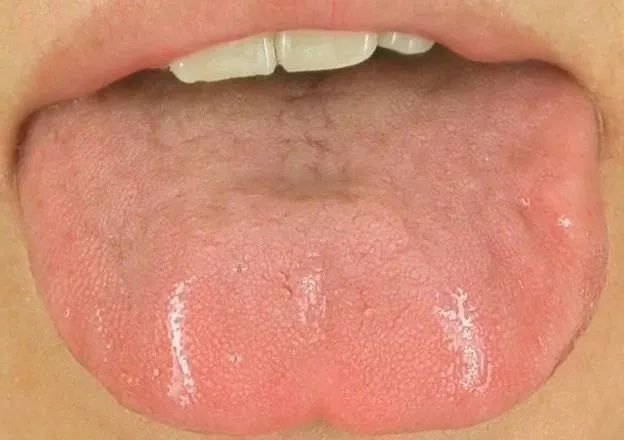
Qi deficiency of the spleen and stomach without coating
Individuals with Qi Deficiency have insufficient Qi throughout the body, characterized by easy fatigue, weak breath, and low organ function.
【Common Manifestations】 Usually short of breath and reluctant to speak, low voice, lack of energy, fatigue, easy sweating. Pale or sallow complexion, dull eyes, bland taste in the mouth, pale lips, lack of luster in hair, dizziness, forgetfulness, normal bowel movements, or constipation without hard stools, or loose stools that feel incomplete, normal or slightly increased urination.
【Tongue Appearance】 ① Teeth marks on the sides of the tongue, thick coating, tongue is round and swollen — Qi deficiency due to dampness; ② Teeth marks on the sides are not obvious, but there are clear cracks in the middle, tongue coating is very thin or absent — deficiency of Zheng Qi, especially spleen and stomach Qi deficiency.
【Treatment Principles】 The health maintenance for Qi deficiency should focus on tonifying Qi, nourishing Qi, and strengthening the spleen. Since the lungs govern the Qi of the body, the kidneys store the original Qi, and the spleen and stomach are the “source of Qi and blood production,” it is essential to often tonify the Qi of the spleen, lungs, and kidneys.
02
Individuals with Yin Deficiency

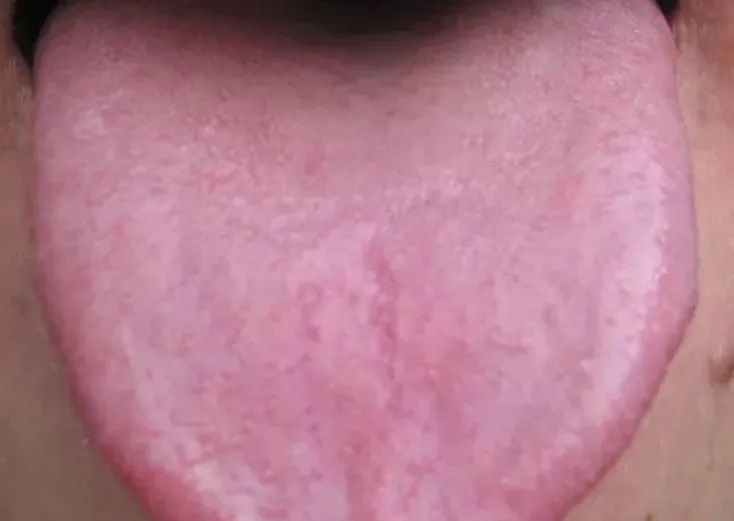
Red tongue without coating
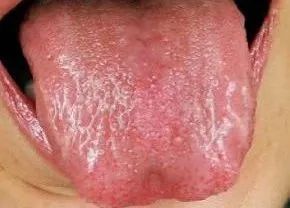
Spleen and stomach Qi deficiency without coating
Individuals with Yin Deficiency have insufficient Yin fluids, characterized by dry mouth and throat, and heat in the palms and soles.
【Common Manifestations】 Heat in the palms and soles, usually dry mouth and throat, slightly dry nose, thirst with a preference for cold drinks, dry stools, often with a flushed complexion, a feeling of heat, dry eyes, blurred vision, slightly dry lips, dry skin, prone to wrinkles, dizziness, tinnitus, poor sleep, and short yellow urination.
【Tongue Appearance】 Red tongue, little coating, or a mirror tongue with a shiny surface and little coating.
【Treatment Principles】 Individuals with Yin deficiency should focus on nourishing Yin, clearing heat, and nourishing the liver and kidneys. Among the five organs, the liver stores blood, and the kidneys store essence; thus, the mutual transformation of essence and blood is essential for nourishing the liver and kidneys.
03
Individuals with Yang Deficiency

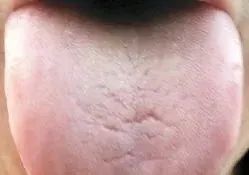
Cracked tongue in the middle
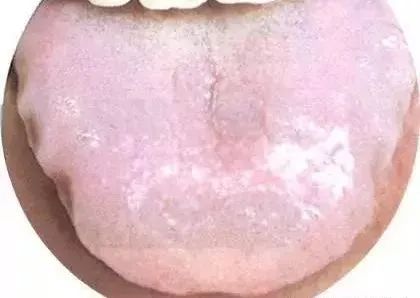
Spleen and blood deficiency
Individuals with Yang Deficiency have insufficient Yang Qi, characterized by fear of cold, cold hands and feet, and other cold symptoms.
【Common Manifestations】 Usually fear of cold, cold hands and feet, preference for warm food, lack of energy, excessive sleep, pale complexion, dull eyes, pale lips, hair loss, easy sweating, loose stools, and clear, long urination.
【Tongue Appearance】 White coating, pale tongue, or a pale, swollen tongue with teeth marks, appearing somewhat aged.
【Treatment Principles】 Yang deficiency is characterized by fear of cold and cold limbs; thus, health maintenance should focus on tonifying Yang, dispelling cold, and warming the spleen and kidneys. Among the five organs, the kidneys are the root of Yang Qi, and the spleen is the source of Yang Qi production, so it is essential to emphasize tonifying the Yang Qi of the spleen and kidneys.
04
Individuals with Blood Stasis

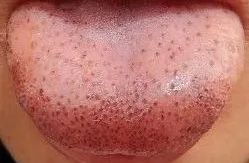
Stasis points on the tongue
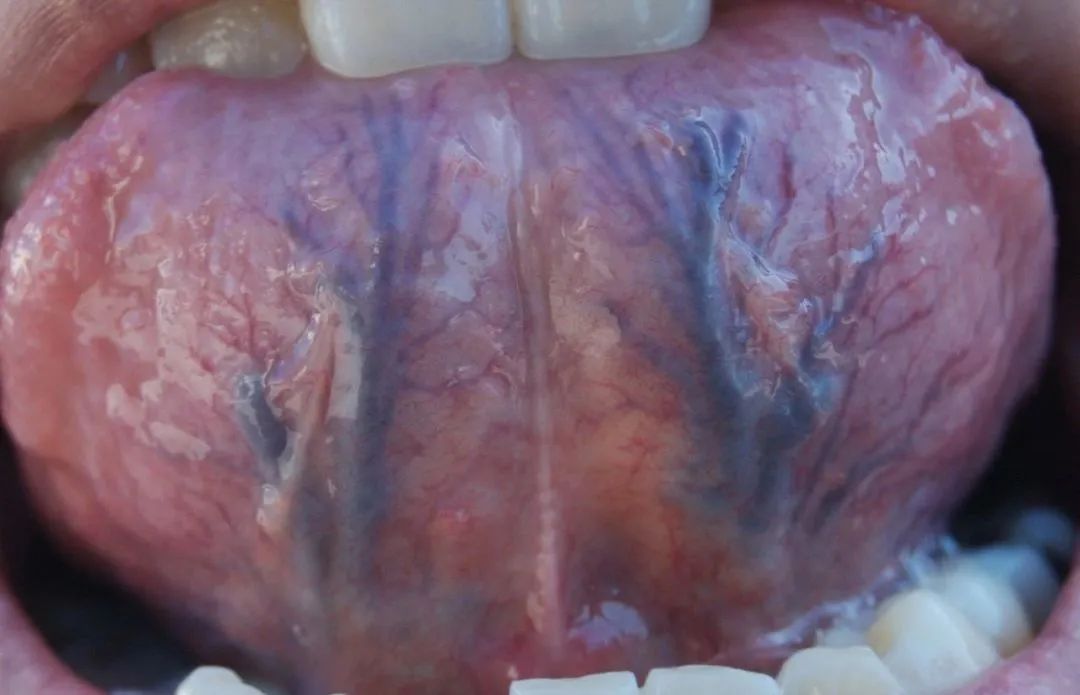
Varicose veins under the tongue
Individuals with Blood Stasis have poor blood circulation, characterized by dark complexion, purple tongue, and other signs of blood stasis.
【Common Manifestations】 Usually dark complexion, dark or pigmented skin, easy bruising, prone to pain, dark or purple lips. Often have dark circles under the eyes, nasal congestion, hair loss, dry skin, or brittle nails; women may experience dysmenorrhea, amenorrhea, or dark purple menstrual blood with clots, or excessive bleeding.
【Tongue Appearance】 ① Obvious stasis points on the tip of the tongue or a bluish or purplish tongue (indicating that blood stasis is about to form but has not yet formed); ② Many black or blue stasis points on the tip and sides of the tongue, with thick and dark veins underneath (indicating severe blood stasis); ③ The tip of the tongue suddenly deviates, indicating blockage of blood flow on that side.
【Treatment Principles】 When Qi flows, blood flows; thus, to invigorate blood, one must first regulate Qi. Therefore, health maintenance for individuals with blood stasis should focus on regulating Qi, soothing the liver, and invigorating blood circulation.
05
Individuals with Phlegm-Dampness

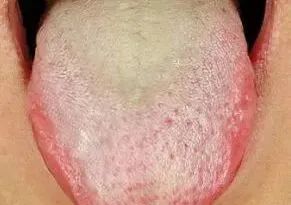
White greasy coating
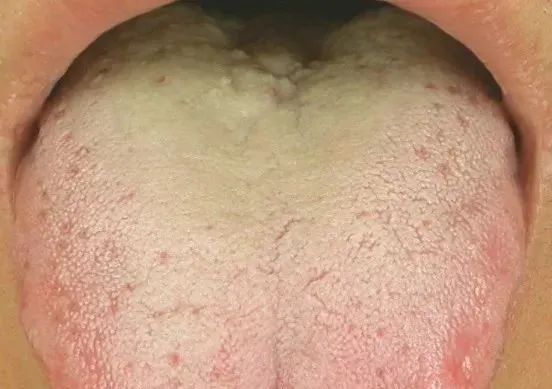
Phlegm-dampness in the middle and lower jiao
Individuals with Phlegm-Dampness have accumulated phlegm-dampness, characterized by obesity, fullness in the abdomen, and a greasy tongue coating.
【Common Manifestations】 Oily skin on the face, excessive sweating, chest tightness, and phlegm production. Often have a yellow, puffy complexion, slightly swollen eyelids, prone to drowsiness, sticky or sweet taste in the mouth, heavy body feeling, slippery pulse, preference for rich foods, loose or sticky stools, and little or cloudy urination.
【Tongue Appearance】 Swollen tongue body, white greasy or thick coating.
【Treatment Principles】 Health maintenance for individuals with phlegm-dampness should focus on strengthening the spleen and eliminating dampness, as the spleen governs the transformation of water and dampness and is the source of phlegm production.
06
Individuals with Damp-Heat

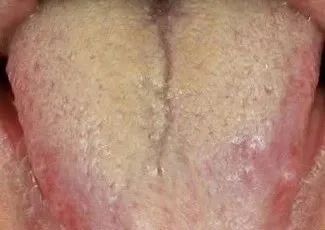
Red tongue with yellow greasy coating
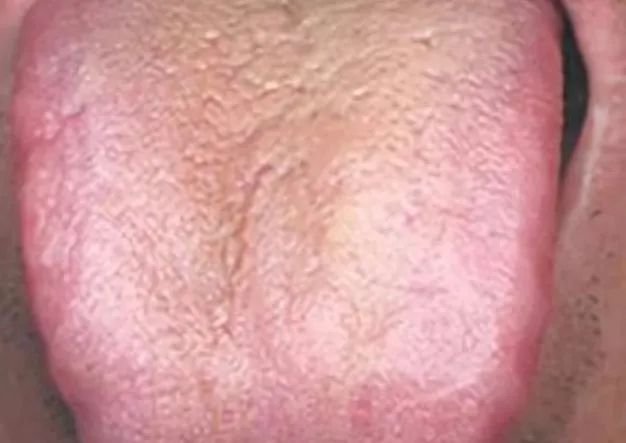
Yellow greasy coating
Individuals with Damp-Heat have internal damp-heat, characterized by oily skin, bitter mouth, and yellow greasy tongue coating.
【Common Manifestations】 Usually have oily skin, prone to acne and pimples, bitter mouth and dry throat, heavy body feeling, often feel irritable, red eyes, dry stools, or sticky stools, short and red urination, men may experience dampness in the scrotum, and women may have excessive vaginal discharge.
【Tongue Appearance】 Red tongue with yellow greasy coating.
【Treatment Principles】 The basic characteristic of individuals with damp-heat is the presence of internal damp-heat; thus, health maintenance should focus on soothing the liver, promoting bile flow, clearing heat, and eliminating dampness. It is essential to ensure the liver and gallbladder functions are normal and to eliminate the sources of damp-heat.
07
Individuals with Qi Stagnation

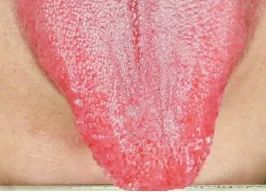
Red tongue with thin coating – Liver Fire
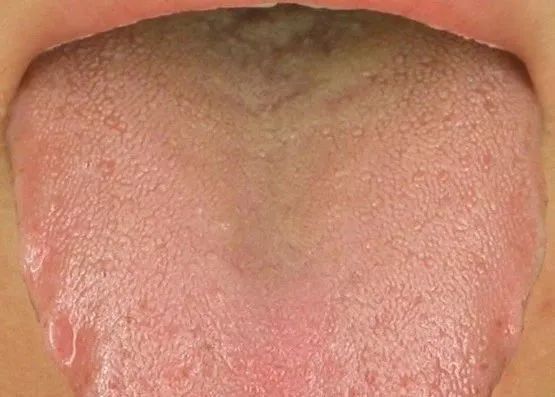
Qi stagnation with blood stasis
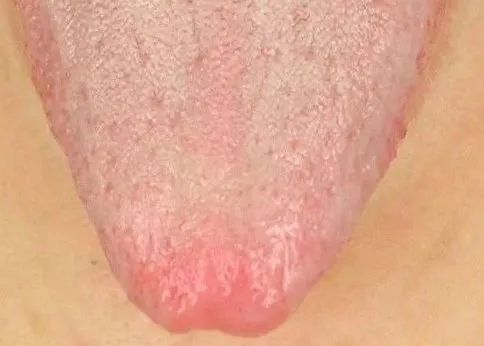
Qi stagnation – Heart Fire
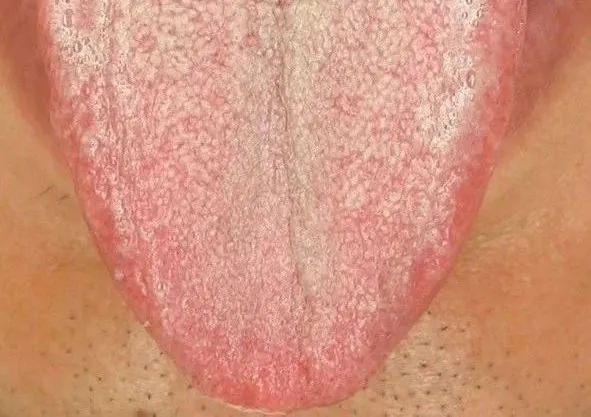
Qi stagnation – Salivary glands
Individuals with Qi Stagnation experience Qi stagnation, characterized by depression, anxiety, and other symptoms of Qi stagnation.
【Common Manifestations】 Usually appear gloomy, often feel depressed and unhappy. Often experience chest and rib fullness, or wandering pain, often accompanied by sighing, belching, or a sensation of a lump in the throat, or breast tenderness, poor sleep, reduced appetite, palpitations, forgetfulness, phlegm production, constipation or dry stools, normal urination.
【Tongue Appearance】 The tongue is pointed and red (even if the tongue has a thick white coating, if the shape is pointed, it indicates Qi stagnation).
【Treatment Principles】 Health maintenance for individuals with Qi stagnation should focus on soothing the liver, relieving stagnation, and regulating Qi. Since the primary cause of Qi stagnation is liver Qi stagnation, it is essential to protect and nourish the liver to ensure its smooth flow.
08
Individuals with Balanced Constitution

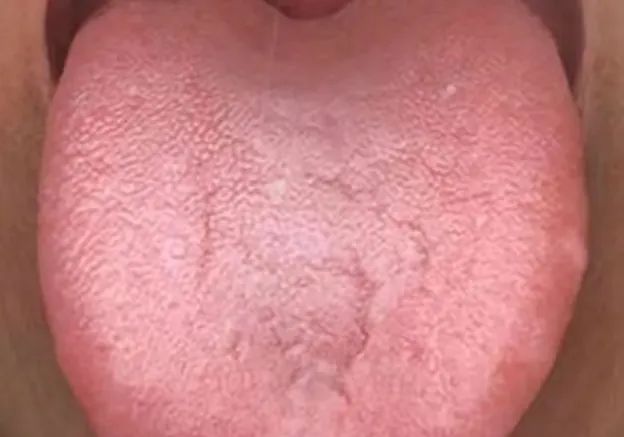
Normal tongue appearance
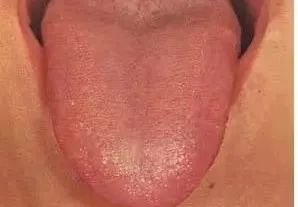
Pale red tongue with thin white coating
Individuals with Balanced Constitution have good innate qualities and proper postnatal care, characterized by moderate body shape, rosy complexion, abundant energy, and strong organ function.
Individuals with a balanced constitution have a harmonious body and strong self-regulation ability. They may not be particularly strong, but their organ and Qi-blood functions are coordinated, and their emotions are stable. They often have a regular lifestyle, stable emotions, minimal weight fluctuations, and strong adaptability to social and environmental changes, rarely falling ill, and when they do, they respond well to treatment and have strong self-recovery abilities.
【Common Manifestations】 Rosy complexion, moist skin, thick and shiny hair, bright eyes, clear sense of smell, normal taste, rosy lips, abundant energy, not easily fatigued, tolerant of cold and heat, peaceful sleep, good appetite, normal bowel movements, pale red tongue, thin white coating, and a harmonious pulse.
【Tongue Appearance】 Pale red tongue with thin white coating. Specifically, the tongue is pale red and bright, moist, of moderate size, soft and flexible, without any abnormal shape; the coating is evenly distributed, white and moist, thinly covering the tongue surface, with moderate dryness and wetness, not sticky or greasy, and cannot be wiped off.
【Treatment Principles】 Individuals with a balanced constitution have a harmonious balance of Yin and Yang, balanced organ functions, smooth Qi and blood flow, and stable emotions. Maintaining and preserving the state of “Yin balanced and Yang secreted” is an important principle for health maintenance in individuals with a balanced constitution.
Individuals with a balanced constitution generally do not need to take supplements. As they age, they may develop towards an imbalanced constitution. Therefore, individuals with a balanced constitution should pay attention to maintaining good lifestyle habits and avoiding various pathogenic factors. In middle age, they can also adopt dietary adjustments, moderate exercise, and acupoint massage as health measures to enhance health and delay aging.

